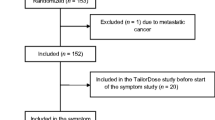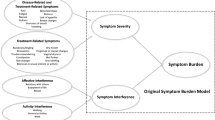Abstract
Purpose
The aim of this study was to identify symptom clusters in breast cancer patients undergoing adjuvant chemotherapy.
Methods
A prospective longitudinal study was conducted. And a sample of 620 breast cancer patients receiving adjuvant chemotherapy was recruited using convenience sampling from May 20, 2020, to March 31, 2021. Data were collected eight times: the first chemotherapy cycle (T1) to the eighth cycle of chemotherapy (T8). Exploratory factor analysis was used to explore the composition of symptom clusters.
Results
Symptoms with an incidence of less than 20% were deleted and the remaining symptoms were included in the factor analysis. Three common factors were extracted in T1, including gastrointestinal symptom cluster, emotional and psychological symptom cluster, and menopausal symptom cluster. Five common factors were extracted from T2 to T7, including gastrointestinal symptom cluster, emotional and psychological symptom cluster, neurological symptom cluster, menopausal symptom cluster, and self-image disorder symptom cluster. Four common factors were extracted at T8, including gastrointestinal symptom cluster, emotional and psychological symptom cluster, neurological symptom cluster, and menopausal symptom cluster.
Conclusion
Breast cancer patients undergoing adjuvant chemotherapy experience multiple symptoms and different symptom clusters in different chemotherapy cycles. It is a benefit for health care providers to better understand and care for breast cancer patients. It will also help such women to manage concurrent symptoms ahead to promote their quality of life.

Similar content being viewed by others
Data availability
The data are not publicly available due to privacy or ethical restrictions.
References
Miller KD, Nogueira L, Mariotto AB, Rowland JH, Yabroff KR, Alfano CM, Jemal A, Kramer JL, Siegel RL (2019) Cancer treatment and survivorship statistics, 2019. CA Cancer J Clin 69(5):363–385. https://doi.org/10.3322/caac.21565
Wong WM, Chan DNS, He X, So WKW (2022) Effectiveness of pharmacological and nonpharmacological interventions for managing the fatigue-sleep disturbance-depression symptom cluster in breast cancer patients undergoing chemotherapy: a systematic review. Cancer Nurs. https://doi.org/10.1097/NCC.0000000000001048
Kim HJ, McGuire DB, Tulman L, Barsevick AM (2005) Symptom clusters: concept analysis and clinical implications for cancer nursing. Cancer Nurs 28(4):270–282; quiz 283-4. https://doi.org/10.1097/00002820-200507000-00005
Lee L, Ross A, Griffith K, Jensen RE, Wallen GR (2020) Symptom clusters in breast cancer survivors: a latent class profile analysis. Oncol Nurs Forum 47(1):89–100. https://doi.org/10.1188/20.ONF.89-100
So WKW, Law BMH, Ng MSN, He X, Chan DNS, Chan CWH, McCarthy AL (2021) Symptom clusters experienced by breast cancer patients at various treatment stages: a systematic review. Cancer Med 10(8):2531–2565. https://doi.org/10.1002/cam4.3794
Chongkham-ang S, Eonghongkui T, Panuthai S, Pinyokham N, Miaskowski C (2018) Symptom experience and symptom clusters of thai women with breast cancer receiving chemotherapy. Pac Rim Int J Nurs Res 22(1):43–57
Al Qadire M, Alsaraireh M, Alomari K, Aldiabat KM, Al-Sabei S, Al-Rawajfah O, Aljezawi M (2021) Symptom clusters predictive of quality of life among Jordanian women with breast cancer. Semin Oncol Nurs 37(2):151144. https://doi.org/10.1016/j.soncn.2021.151144
Zhang J, Wu ZH, Li J, Shen Y, Bu QY, Bai YL, Liu CX (2017) Investigation on symptoms group and its influencing factors in patients with breast cancer during chemotherapy. Chinese Nurs Res 31(32):4097–4102. https://doi.org/10.3969/issn.1009-6493.2017.32.017
Huang QM, Geng ZH, Wu FL, Zhang W, Cai TT, Yuan CR (2020) Study on differential characters of symptom clusters and predictors of breast cancer patients during chemotherapy. Chinese J Nurs 55(9):1297–1303. https://doi.org/10.3761/j.issn.0254-1769.2020.09.003
Albusoul RM, Berger AM, Gay CL, Janson SL, Lee KA (2017) Symptom clusters change over time in women receiving adjuvant chemotherapy for breast cancer. J Pain Symptom Manag 53(5):880–886. https://doi.org/10.1016/j.jpainsymman.2016.12.332
Fox RS, Ancoli-Israel S, Roesch SC, Merz EL, Mills SD, Wells KJ, Sadler GR, Malcarne VL (2020) Sleep disturbance and cancer-related fatigue symptom cluster in breast cancer patients undergoing chemotherapy. Support Care Cancer 28(2):845–855. https://doi.org/10.1007/s00520-019-04834-w
Sanford SD, Beaumont JL, Butt Z, Sweet JJ, Cella D, Wagner LI (2014) Prospective longitudinal evaluation of a symptom cluster in breast cancer. J Pain Symptom Manag 47(4):721–730. https://doi.org/10.1016/j.jpainsymman.2013.05.010
Cheng KK, Wong EM, Ling WM, Chan CW, Thompson DR (2009) Measuring the symptom experience of Chinese cancer patients: a validation of the Chinese version of the memorial symptom assessment scale. J Pain Symptom Manage 37(1):44–57. https://doi.org/10.1016/j.jpainsymman.2007.12.019
Xiao C, Hanlon A, Zhang Q, Ang K, Rosenthal DI, Nguyen-Tan PF, Kim H, Movsas B, Bruner DW (2013) Symptom clusters in patients with head and neck cancer receiving concurrent chemoradiotherapy. Oral Oncol 49(4):360–366. https://doi.org/10.1016/j.oraloncology.2012.10.004
Norris M, Lecavalier L (2010) Evaluating the use of exploratory factor analysis in developmental disability psychological research. J Autism Dev Disord 40(1):8–20. https://doi.org/10.1007/s10803-009-0816-2
Velicer W, Peacock A, Jackson D (1982) A comparison of factor patterns: a Monte Carlo approach. Multivar Behav Res 17:371–388
Wood J, Tataryn D, Gorsuch R (1996) Effects of under- and over- extraction on principal axis factor analysis with varimax rotation. Psychol Methods 1(4):354–365
Chang VT, Hwang SS, Feuerman M, Kasimis BS (2000) Symptom and quality of life survey of medical oncology patients at a veterans affairs medical center: a role for symptom assessment. Cancer 88(5):1175–1183. https://doi.org/10.1002/(sici)1097-0142(20000301)88:5<1175::aid-cncr30>3.0.co;2-n
Sullivan CW, Leutwyler H, Dunn LB, Cooper BA, Paul SM, Levine JD, Hammer M, Conley YP, Miaskowski CA (2018) Stability of symptom clusters in patients with breast cancer receiving chemotherapy. J Pain Symptom Manag 55(1):39–55. https://doi.org/10.1016/j.jpainsymman.2017.08.008
Kenne Sarenmalm E, Browall M, Gaston-Johansson F (2014) Symptom burden clusters: a challenge for targeted symptom management. A longitudinal study examining symptom burden clusters in breast cancer. J Pain Symptom Manage 47(4):731–741. https://doi.org/10.1016/j.jpainsymman.2013.05.012
de Vries YC, van den Berg MMGA, de Vries JHM, Boesveldt S, de Kruif JTCM, Buist N, Haringhuizen A, Los M, Sommeijer DW, Timmer-Bonte JHN, van Laarhoven HWM, Visser M, Kampman E, Winkels RM (2017) Differences in dietary intake during chemotherapy in breast cancer patients compared to women without cancer. Support Care Cancer 25(8):2581–2591. https://doi.org/10.1007/s00520-017-3668-x
Song HJ, Seo HJ, Lee H, Son H, Choi SM, Lee S (2015) Effect of self-acupressure for symptom management: a systematic review. Complement Ther Med 23(1):68–78. https://doi.org/10.1016/j.ctim.2014.11.002
Ping Q, Yang CC, Marshall SA, Avis NE, Ip EH (2016) Breast cancer symptom clusters derived from social media and research study data using improved K-medoid clustering. IEEE Trans Comput Soc Syst 3(2):63–74. https://doi.org/10.1109/TCSS.2016.2615850
Hamash KI, Umberger W, Aktas A, Walsh D, Cheruvu VK (2018) The effect of the pain symptom cluster on performance in women diagnosed with advanced breast cancer: the mediating role of the psychoneurological symptom cluster. Pain Manag Nurs 19(6):627–636. https://doi.org/10.1016/j.pmn.2018.05.002
Wang QX, Sun TJ, Liu Y, Li LL (2015) Analysis on symptom clusters of breast cancer patients receiving postoperative chemotherapy and its influencing factors. Chinese Nurs Res 29(5):556–560
Browall M, Brandberg Y, Nasic S, Rydberg P, Bergh J, Rydén A, Xie H, Eriksson I, Wengström Y (2017) A prospective exploration of symptom burden clusters in women with breast cancer during chemotherapy treatment. Support Care Cancer 25(5):1423–1429. https://doi.org/10.1007/s00520-016-3527-1
Xu S, Thompson W, Ancoli-Israel S, Liu L, Palmer B, Natarajan L (2018) Cognition, quality-of-life, and symptom clusters in breast cancer: using Bayesian networks to elucidate complex relationships. Psychooncology 27(3):802–809. https://doi.org/10.1002/pon.4571
Ho SY, Rohan KJ, Parent J, Tager FA, McKinley PS (2015) A longitudinal study of depression, fatigue, and sleep disturbances as a symptom cluster in women with breast cancer. J Pain Symptom Manag 49(4):707–715. https://doi.org/10.1016/j.jpainsymman.2014.09.009
Buck HG, Benitez B, Fradley MG, Donovan KA, McMillan SC, Reich RR, Wang HL (2020) Examining the relationship between patient fatigue-related symptom clusters and carer depressive symptoms in advanced cancer dyads: a secondary analysis of a large hospice data set. Cancer Nurs 43(6):498–505. https://doi.org/10.1097/NCC.0000000000000737
Donovan HS, Hartenbach EM, Method MW (2005) Patient-provider communication and perceived control for women experiencing multiple symptoms associated with ovarian cancer. Gynecol Oncol 99(2):404–411. https://doi.org/10.1016/j.ygyno.2005.06.062
Barnes EA, Bruera E (2002) Fatigue in patients with advanced cancer: a review. Int J Gynecol Cancer 12(5):424–428. https://doi.org/10.1046/j.1525-1438.2002.t01-1-01147.x
Hesketh PJ, Batchelor D, Golant M, Lyman GH, Rhodes N, Yardley D (2004) Chemotherapy-induced alopecia: psychosocial impact and therapeutic approaches. Support Care Cancer 12(8):543–549. https://doi.org/10.1007/s00520-003-0562-5
Funding
This research was supported by National Natural Science Foundation of China(grant number 72174042).
Author information
Authors and Affiliations
Contributions
Conceptualization: Ruzhen Luo; methodology: Ruzhen Luo; formal analysis and investigation: Ruzhen Luo, Yuhong Chen, Hongbo Chen; writing (original draft preparation): Ruzhen Luo; writing (review and editing): Ruzhen Luo, Hongyu Sun, Siyuan Tang; funding acquisition: Hongyu Sun; resources: Yanhui Liu; supervision: Yanhui Liu.
Corresponding authors
Ethics declarations
Ethics approval
This study was approved by the institutional review boards of Tianjin University of Traditional Chinese Medicine.
Consent to participate
All participants provided informed consent.
Conflict of interest
The authors declare no competing interests.
Additional information
Publisher’s Note
Springer Nature remains neutral with regard to jurisdictional claims in published maps and institutional affiliations.
Rights and permissions
Springer Nature or its licensor (e.g. a society or other partner) holds exclusive rights to this article under a publishing agreement with the author(s) or other rightsholder(s); author self-archiving of the accepted manuscript version of this article is solely governed by the terms of such publishing agreement and applicable law.
About this article
Cite this article
Luo, R., Chen, H., Liu, Y. et al. Symptom clusters among breast cancer patients in relation to chemotherapy cycles: a longitudinal study. Support Care Cancer 31, 573 (2023). https://doi.org/10.1007/s00520-023-08038-1
Received:
Accepted:
Published:
DOI: https://doi.org/10.1007/s00520-023-08038-1




